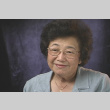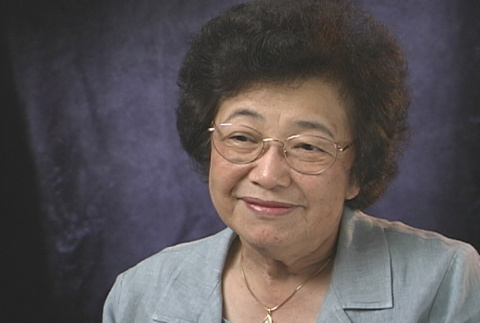50 items
- 1
- 2

vh
Marion Tsutakawa Kanemoto Interview Segment 2 (ddr-densho-1000-148-2)
Parents married in Japan, mother immigrates to United States as a "treaty merchant"

vh
Marion Tsutakawa Kanemoto Interview Segment 48 (ddr-densho-1000-148-48)
Receiving a letter stating denial of redress, deciding to file a lawsuit

vh
Marion Tsutakawa Kanemoto Interview Segment 39 (ddr-densho-1000-148-39)
Learning of oldest brother's life in Japan and his participation in the clean up after the atomic bombing of Hiroshima; reaction to hearing of the end of the war

vh
Marion Tsutakawa Kanemoto Interview Segment 17 (ddr-densho-1000-148-17)
FBI picks up father, ransacks family home

vh
Marion Tsutakawa Kanemoto Interview Segment 20 (ddr-densho-1000-148-20)
Preparing for mass removal: sadness at selling belongings such as a piano, feeling a slight thrill when buying new suitcases

vh
Marion Tsutakawa Kanemoto Interview Segment 49 (ddr-densho-1000-148-49)
Filing a class-action lawsuit to receive redress, finally succeeding in 1996

vh
Marion Tsutakawa Kanemoto Interview Segment 6 (ddr-densho-1000-148-6)
Taking lessons as a child: sewing and piano

vh
Marion Tsutakawa Kanemoto Interview Segment 25 (ddr-densho-1000-148-25)
Keeping busy in camp: joining a knitting circle, reading magazines

vh
Marion Tsutakawa Kanemoto Interview Segment 14 (ddr-densho-1000-148-14)
Participation in kenjinkai activities; advantages of father's wholesale connections

vh
Marion Tsutakawa Kanemoto Interview Segment 46 (ddr-densho-1000-148-46)
Meeting future husband at a New Year's dance

vh
Marion Tsutakawa Kanemoto Interview Segment 16 (ddr-densho-1000-148-16)
Memories of the bombing of Pearl Harbor: mother's fear of deportation, parents' "demeanor was so different"

vh
Marion Tsutakawa Kanemoto Interview Segment 11 (ddr-densho-1000-148-11)
Holiday celebrations, attending the Episcopal church

vh
Marion Tsutakawa Kanemoto Interview Segment 31 (ddr-densho-1000-148-31)
Stopping in Goa, India, to board the Japanese troop ship Teiya maru; memories of terrible food, Japanese language classes

vh
Marion Tsutakawa Kanemoto Interview Segment 1 (ddr-densho-1000-148-1)
Family background: father came to United States from Japan to help with the family business

vh
Marion Tsutakawa Kanemoto Interview Segment 47 (ddr-densho-1000-148-47)
Doing research in Washington, D.C. in an attempt to track down and recover father's assets from before the war

vh
Marion Tsutakawa Kanemoto Interview Segment 12 (ddr-densho-1000-148-12)
Entrepreneurial spirit of father

vh
Marion Tsutakawa Kanemoto Interview Segment 37 (ddr-densho-1000-148-37)
Participating in military drills in school in Japan; hearing anti-American propaganda from a teacher

vh
Marion Tsutakawa Kanemoto Interview Segment 44 (ddr-densho-1000-148-44)
Returning to the United States: enrolling in St. Mary's teaching hospital as a student nurse

vh
Marion Tsutakawa Kanemoto Interview Segment 8 (ddr-densho-1000-148-8)
Returning to the United States, attending junior high school and Japanese language school

vh
Marion Tsutakawa Kanemoto Interview Segment 10 (ddr-densho-1000-148-10)
Generosity of father, description of his eagerness to learn new things

vh
Marion Tsutakawa Kanemoto Interview Segment 36 (ddr-densho-1000-148-36)
Watching as bombs were being dropped on neighboring cities: participating in air raid drills, feeling numb, desensitized

vh
Marion Tsutakawa Kanemoto Interview Segment 24 (ddr-densho-1000-148-24)
Moving to the Minidoka concentration camp, Idaho: MPs with guns, crowded conditions, dust

vh
Marion Tsutakawa Kanemoto Interview Segment 9 (ddr-densho-1000-148-9)
Ethnic composition of students in junior high school: "I was always aware that I was Japanese"

vh
Marion Tsutakawa Kanemoto Interview Segment 40 (ddr-densho-1000-148-40)
Father's work as a liaison between the Japanese police and the American occupation forces

vh
Marion Tsutakawa Kanemoto Interview Segment 35 (ddr-densho-1000-148-35)
Adjusting to life as an American in Japan
- 1
- 2
